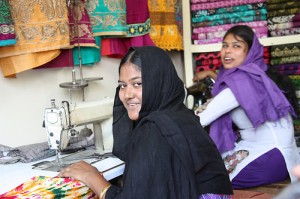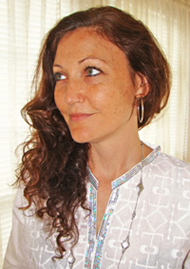Anna Marie Troupe was born in Mississippi in 1977 and grew up in Huntsville, Alabama. The fifth daughter of a mechanical engineer and an administrative assistant, Anna made a point of pushing the boundaries of her creativity. She studied furniture design at Savannah College of Art and Design and had the honor of exhibiting a chair at the Salone del Mobila in Milan, Italy. Her work was also published in a book called, “Creative Solutions for Unusual Projects.”
Anna began blogging about humanitarian design in 2008 as the social design movement was just gaining steam. In 2011, she won a fabric design competition that was created to support the weaving communities of Bangladesh and preserve their traditional craft. Upon discovering that she lived near the top-ranking textile program in the world, Anna entered NCSU’s College of Textiles and was hired to study sustainability. An invitation to present on the United Nations’ Agenda 21 guided her research towards sustainable development, as did the recent industry disasters occurring in Bangladesh. Anna graduated in July 2014 and continues to pursue her ideas for helping the textiles and clothing industry become ethical and beneficial to society.
Q. Let us start with your research topic. What is your research area? Will you please tell us a bit more on this? What did you find?
Anna Troupe: I’m very interested in sustainable development, particularly social equality. The global textiles and clothing industry is fundamental to the development of nations and has an enormous impact socially, environmentally and economically. So my research addresses the social challenges in this sector which include creating humane workplaces, increasing the industry’s awareness of and commitment to sustainable development, and improving the integrity and efficiency of its manufacturing model.
More specifically, I’ve found that factory managers are central to these aims, with significant untapped potential to improve worker wellbeing and safety, as well as productivity and efficiency. Lack of training and know-how is a substantial obstacle to garment factory compliance.

Anna Troupe: ‘About 80% of garment factory workers are women, many of them very young and uneducated and many of them with children’. Image credit: Narayan Debnath/DFID (Source: Flickr)
Q. Why is this important? (i.e. why should the general public care about this?)
Anna Troupe: For a host of reasons including a lack of legitimacy/credibility of current labor standards and poor governmental regulatory enforcement, the public has no way of knowing whether the clothes they buy and wear are made under circumstances of abuse and exploitation. Lack of transparency and low communication along the supply chain characterize this industry, while increasingly challenging conditions are the norm rather than the exception.
In general, about 80% of garment factory workers are women, many of them very young and uneducated and many of them with children. The plight of impoverished women is a core environmental, social and economic concern. Failing to properly support their wellbeing is not only inhumane, it keeps the world on a downward track of poverty and social ills. The poorest countries in the world suffer the worst environmental degradation and social unrest. Yet many of these are where clothes are made and their economies depend on this trade. The answer is not to stop making clothes there, but to take responsibility for the impact on those communities and use the opportunity to benefit consumers everywhere by supporting these countries’ sustainable growth.
Unfortunately, many consumers cannot see the big picture due to their focus on the immediate impact of clothing purchases on their wallet. They are unaware that they are participating in a system that is actually impoverishing everyone, as evidenced by the severely divergent trends of consumer goods prices and real measures of wellbeing such as childcare, healthcare and education.

Anna Troupe. In 2011, Anna won a fabric design competition that was created to support the weaving communities of Bangladesh and preserve their traditional craft.
Q. Is this truly new information or does it confirm what other researchers have found?
Anna Troupe: The concept of training and certifying individual factory managers with sustainable development in mind as my thesis recommends, is, I believe, a new proposal that is significant because it is a comprehensive approach to a broad range of problems that affect virtually all stakeholders in the global garment industry. This idea certainly was driven by findings in a number of areas that are widely researched and well documented. In fact, my work is founded on the core principles of leading firms and more than two decades of sustainability research. For instance the ideas contained in the United Nations’ Agenda 21 declaration on sustainable action, drafted in 1992, strongly influence my approach to compliance and supply chain management. That document reaffirms and builds upon the ideas stated in the Stockholm Declaration of 1972. So these principles have been around for some time yet no one has applied them specifically in the way that I have.
Q. How did you land here? Was it your goal?
Anna Troupe: My background is in design and I began blogging about humanitarian design and socially responsible design in 2008. I knew this was the direction I wanted to go in, but I didn’t know how to get involved exactly. In 2011, I entered and won a fabric design competition that had a social premise: the project was about supporting the hand-weaving communities in rural Bangladesh (one of the poorest countries in the world) and preserving their traditional craft. Through this experience I knew I wanted to learn more about fabric and clothing and the social impact. It happened that I lived in the vicinity of the top ranking textiles program in the world: North Carolina State University’s College of Textiles. Once I got in the program, I was hired as an RA to work on sustainability. Soon after, I was invited to speak on the United Nations’ Agenda 21 to an important trade organization and that engagement guided my thesis work. Then the worst disaster in garment industry history happened, the collapse of Rana Plaza. Upon reading the details of this and previous tragedies, I knew that worker well being was completely disregarded by this industry. My literature review bore out the notion that factory managers were central figures who were significantly impacting the experience and safety of the worker, yet they lacked the know-how to ensure that impact was a positive one.
Q. How many hours a day you spend for study. How you arrange other side of your life like social activities so to say?
Anna Troupe: While in school I spent around 12-14 hours a day studying. Now that I have finished, it is more like 8 to 10 (because I am trying to continue the research of my thesis and implement the idea in the real world). I make sure to allow time for daily exercise and to read the news, but I tend to hold off on social activities until there is something specific and meaningful that I want to do. I interact with friends frequently online.
Q. Are you satisfied with your results? What about your publications?
Anna Troupe: Yes, so far, but I am really just getting started. My master’s thesis will publish in July. The topic is so broad that I have handled it the best I can, but there is so much more to do. I am currently planning out a year of work for investors who are interested in funding me. I have submitted an abstract for a paper on a related but slightly different subject for one conference and I don’t yet know if it will be accepted. That paper relates to an ethical fashion project with a cottage sewing industry in India that I am involved in and researching right now. There is strong interest in this project as well so yes – I’m satisfied that opportunities to put my research into practice are coming to me and I’m finding the right people to enable my efforts.
Q. If you would not be at your current profession, what other options would you consider for your career?
Anna Troupe: The nice thing about the textiles and clothing field is that there are so many different directions one could pursue. I could be a designer of clothing or fabric, a fashion illustrator, a brand manager, a marketing professional, a buyer, merchandiser, and the list goes on. However, given my propensity for personal expression, it’s most likely I would stick to product design of some kind if I could not work directly on social problems.
Thank You.
